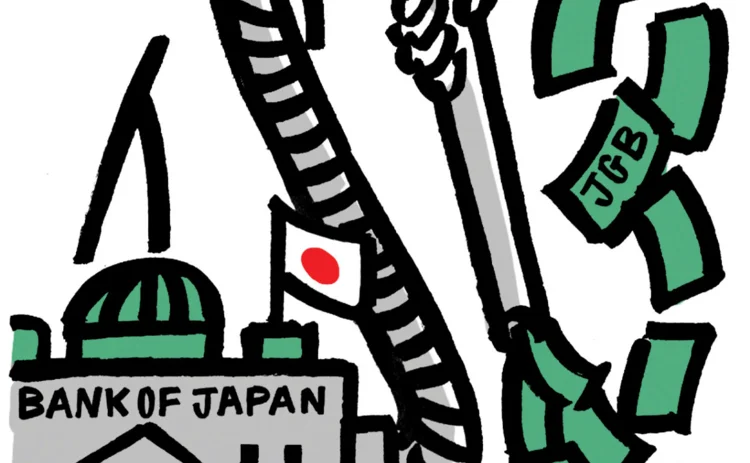
In-depth introduction: Japan
Senior officials at the BoJ and JFSA speak to Risk.net about QE, Basel III and more

Japan's finance ministry plans to issue new bonds this year worth a total of ¥36.9 trillion ($309.1 billion). The country's central bank, meanwhile, is planning to buy ¥80 trillion of the debt, under its expanded quantitative easing programme. It's a bold attempt to support the economy and help hit a 2% inflation target, but it has some risks – not least that the Japanese government bond (JGB) market might grind to a halt if the Bank of Japan (BoJ) hoovers up all the available supply.
The BoJ's deputy governor, Hiroshi Nakaso, doesn't seem the type to take fright easily. The BoJ will hit its 2% target, he insists, and it will continue buying bonds until it has achieved its goal. That should come in the first half of the 2016 fiscal year, he predicts, oil prices permitting.
Nakaso admits the depth of the JGB futures market has suffered since the central bank expanded its bond-buying programme in October last year – as demonstrated by analysis the BoJ published in August – but not to the extent that quantitative easing will need to be reined in, he says.
Over at Japan's Financial Services Agency (FSA), Shunsuke Shirakawa is a similarly forthright character. The deputy commissioner for international affairs is calling for the Basel Committee on Banking Supervision to help clarify the status of the counter-cyclical capital buffers that members states are obliged to introduce as part of Basel III. Supervisors are free to set these buffers at 0% – as the FSA will, says Shirakawa, while economic growth is still fragile – but banks that are active internationally will be subject to the buffers of every country in which they have exposure, and many have not yet implemented them. Shirakawa wants the relevant information for each state to be published on the Basel Committee's site.
In Europe, things are made more complicated by the fact that some member states of the EU are not members of the Basel Committee and may, or may not, be required to introduce the buffers. Clarification is "urgently needed", Shirakawa says.
The BoJ will hit its 2% target, he insists, and it will continue buying bonds until it has achieved its goal
In addition, he mentions the FSA is considering the possibility of using Japan's deposit insurance system as a backstop for central counterparties – an intriguing idea, but one that would need parliamentary approval – and also lifts the lid on a cross-border dispute with the Commodity Futures Trading Commission.
There are some concerns shared by both men. As Japanese banks expand internationally, they must ensure they have stable funding in currencies that match their new assets, they warn – and both also strike a cautionary note on expanding bank capital requirements. Once the current programme of work is complete, says the BoJ's Nakaso, "we need to ensure the right communication with banks and tell market participants that additional prudential regulations will not be introduced for some time".
Only users who have a paid subscription or are part of a corporate subscription are able to print or copy content.
To access these options, along with all other subscription benefits, please contact info@risk.net or view our subscription options here: http://subscriptions.risk.net/subscribe
You are currently unable to print this content. Please contact info@risk.net to find out more.
You are currently unable to copy this content. Please contact info@risk.net to find out more.
Copyright Infopro Digital Limited. All rights reserved.
As outlined in our terms and conditions, https://www.infopro-digital.com/terms-and-conditions/subscriptions/ (point 2.4), printing is limited to a single copy.
If you would like to purchase additional rights please email info@risk.net
Copyright Infopro Digital Limited. All rights reserved.
You may share this content using our article tools. As outlined in our terms and conditions, https://www.infopro-digital.com/terms-and-conditions/subscriptions/ (clause 2.4), an Authorised User may only make one copy of the materials for their own personal use. You must also comply with the restrictions in clause 2.5.
If you would like to purchase additional rights please email info@risk.net
More on Regulation
Esma supervision proposals ensnare Bloomberg and Tradeweb
Derivatives and bonds venues would become subject to centralised supervision, along with MarketAxess
Industry frowns on FCA’s single-sided trade reporting efforts
Buy side warns UK attempt to ease Mifir burden may miss target; dealers aren’t happy either
One vision, two paths: UK reporting revamp diverges from EU
FCA and Esma could learn from each other on how to cut industry compliance costs
Market doesn’t share FSB concerns over basis trade
Industry warns tougher haircut regulation could restrict market capacity as debt issuance rises
FCMs warn of regulatory gaps in crypto clearing
CFTC request for comment uncovers concerns over customer protection and unchecked advertising
UK clearing houses face tougher capital regime than EU peers
Ice resists BoE plan to move second skin in the game higher up capital stack, but members approve
ECB seeks capital clarity on Spire repacks
Dealers split between counterparty credit risk and market risk frameworks for repack RWAs
FSB chief defends global non-bank regulation drive
Schindler slams ‘misconception’ that regulators intend to impose standardised bank-like rules








